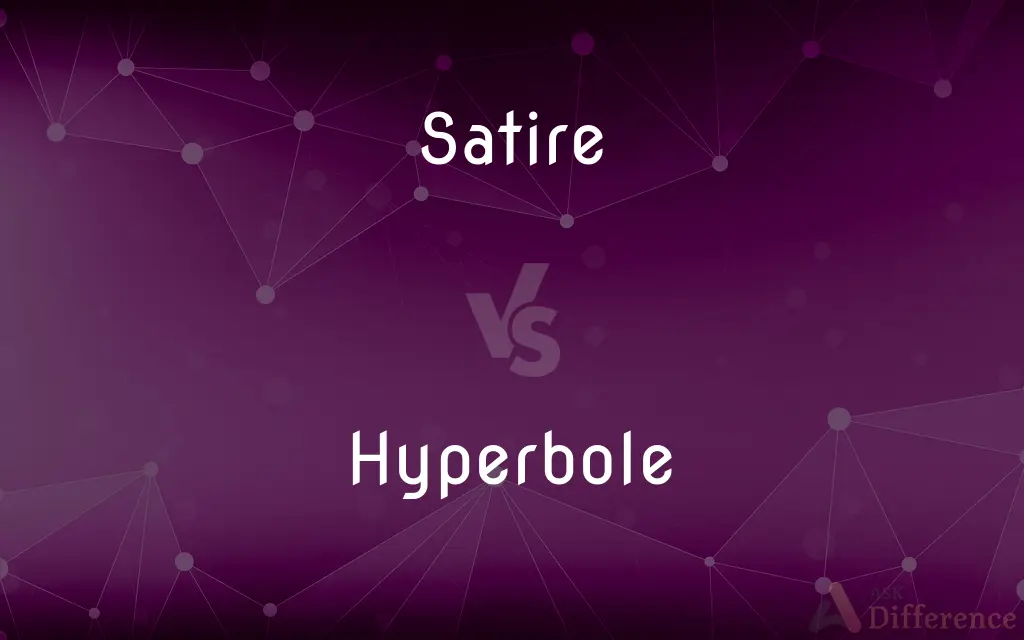Satire vs. Hyperbole — What's the Difference?

Difference Between Satire and Hyperbole
ADVERTISEMENT
Compare with Definitions
Satire
Satire is a genre of the visual, literary, and performing arts, usually in the form of fiction and less frequently non-fiction, in which vices, follies, abuses, and shortcomings are held up to ridicule, with the intent of shaming individuals, corporations, government, or society itself into improvement. Although satire is usually meant to be humorous, its greater purpose is often constructive social criticism, using wit to draw attention to both particular and wider issues in society.
Hyperbole
Hyperbole (, listen) (adjective form hyperbolic, listen) is the use of exaggeration as a rhetorical device or figure of speech. In rhetoric, it is also sometimes known as auxesis (literally 'growth').
Satire
A literary work in which human foolishness or vice is attacked through irony, derision, or wit.
Hyperbole
Exaggerated statements or claims not meant to be taken literally
He vowed revenge with oaths and hyperboles
You can't accuse us of hyperbole
Satire
The branch of literature constituting such works.
ADVERTISEMENT
Hyperbole
A figure of speech in which exaggeration is used for emphasis or effect, as in I could sleep for a year or This book weighs a ton.
Satire
Irony, sarcasm, or caustic wit used to attack or expose human foolishness or vice.
Hyperbole
Deliberate or unintentional overstatement, particularly extreme overstatement.
Satire
(uncountable) A literary device of writing or art which principally ridicules its subject often as an intended means of provoking or preventing change or highlighting a shortcoming in the work of another. Humor, irony, and exaggeration are often used to aid this.
Hyperbole
(countable) An instance or example of such overstatement.
Satire
(countable) A satirical work.
A stinging satire of American politics.
Hyperbole
A hyperbola.
Satire
Severity of remark.
Hyperbole
A figure of speech in which the expression is an evident exaggeration of the meaning intended to be conveyed, or by which things are represented as much greater or less, better or worse, than they really are; a statement exaggerated fancifully, through excitement, or for effect.
Our common forms of compliment are almost all of them extravagant hyperboles.
Somebody has said of the boldest figure in rhetoric, the hyperbole, that it lies without deceiving.
Satire
A composition, generally poetical, holding up vice or folly to reprobation; a keen or severe exposure of what in public or private morals deserves rebuke; an invective poem; as, the Satires of Juvenal.
Hyperbole
Extravagant exaggeration
Satire
Keeness and severity of remark; caustic exposure to reprobation; trenchant wit; sarcasm.
Satire
Witty language used to convey insults or scorn;
He used sarcasm to upset his opponent
Irony is wasted on the stupid
Satire is a sort of glass, wherein beholders do generally discover everybody's face but their own
Share Your Discovery

Previous Comparison
Sangria vs. Cava
Next Comparison
Mocker vs. Scoffer













































